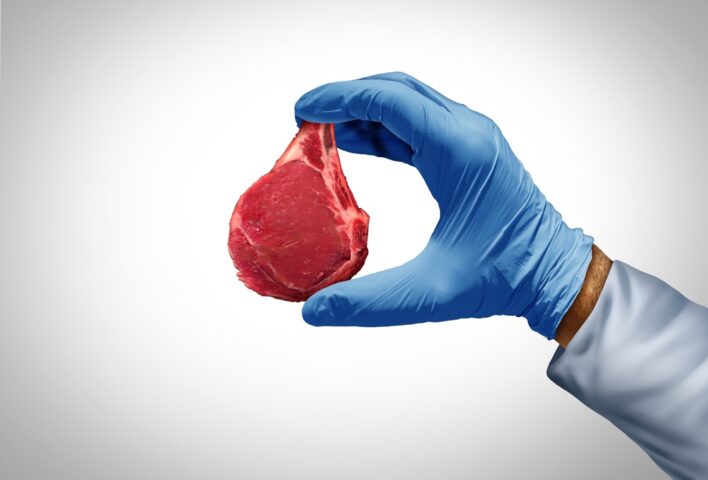Lab-grown meat: our best shot at stopping slaughter?

Our Chief Executive Richard McIlwain considers the government’s new national vision for engineering biology and its focus on lab-grown meat.
In amongst the various announcements coming out of COP28, and coverage of Boris Johnson’s appearance at the Covid inquiry, a piece of news dropped this week that hasn’t made headlines but was compelling to say the least, particularly if you are interested in the new ‘novel foods’ being researched and produced in countries around the globe.
Techniques for producing meat and dairy without the need for animal slaughter have been under development for some years, with Singapore and the USA having approved the sale of ‘meat’ developed through these new processes. The UK has perhaps been a little slow to catch up. But catch up it clearly means to do, and the release of a new strategy backed by £2bn of investment is aimed at putting the UK at the forefront of this new industry.
This was outlined in the newly formed Department of Science, Innovation and Technology’s national vision for engineering biology, published this week with a foreword from the new Minister for Science, Research and Innovation Andrew Griffith MP (complete with the obligatory Union Jack-bedecked ministerial photograph).
In summary, over the next 10 years, the government wants to ‘seize the potential of biotechnology’ in order to drive medical advancements, more sustainable fuel, and – critically as far as we’re concerned – revolutionise food production. The government is clearly looking at processes to develop the production of cell-cultivated or ‘lab-grown’ meat – that is, meat developed from animal cells, but almost certainly without the ongoing need to rear and slaughter animals.
This is the fascinating bit from our perspective. Because having attended both the Conservative and Labour party political conferences this year, we found that ministers and their shadow representatives were all of a common mind: that telling people to cut back on meat was a non-starter. No-one wanted to be seen ‘telling the British public what to eat’. Unfortunately.
And yet, in this report, one line jumped out at me up front in the executive summary, which I’ll quote below:
‘The Department for Environment, Food and Rural Affairs see potential for improving food security and protecting the environment with pest-resistant crops (reducing pesticide use) and alternative proteins (reducing pressure on land use for pasture).’
The words in those last brackets jump out. It suggests that while government may not (yet) feel able to encourage people to eat less meat, they might feel able to champion meat developed via ‘engineering biology’, i.e. cell-cultivated meat. Which in turn means we need less cows, we need to graze less pasture, and we can turn that pasture over to other uses: for food, carbon capture, or biodiversity.
Now clearly, I’d imagine that the vast majority of vegetarians and vegans are not going to revert to eating meat no matter how it’s produced. As a charity, we at the Vegetarian Society will always extol the many benefits of a balanced, predominantly whole-foods vegetarian or vegan diet, particularly in this instance for health. We will always campaign for meat-free diets and hopefully inspire ever greater numbers of people to become vegetarian or vegan.
But there are people who simply will never countenance not having meat on their plate. And so having a government which is actively backing ways of creating meat that limits – and maybe, in future, eradicates – the need for livestock farming is probably a good thing. If this opens up yet another pathway to end the brutal slaughter of millions of sentient animals across the UK and globally, then it feels like a technology we should perhaps support, even if it’s not something we will ultimately participate in.
As a Society, we’d be really happy to hear your opinion on this topic. Feel free to drop us a line at hello@vegsoc.org.
